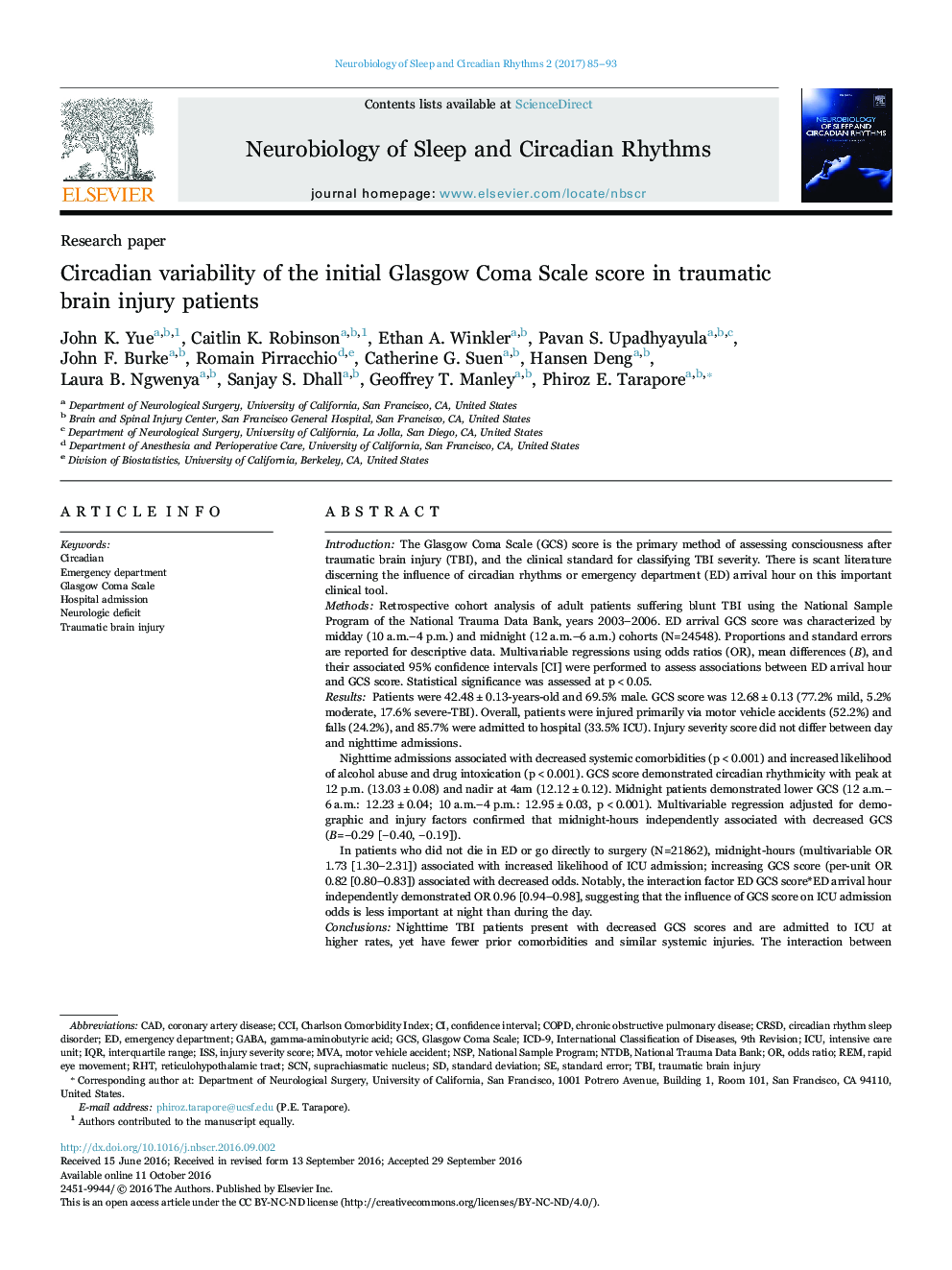| کد مقاله | کد نشریه | سال انتشار | مقاله انگلیسی | نسخه تمام متن |
|---|---|---|---|---|
| 5736155 | 1613187 | 2017 | 9 صفحه PDF | دانلود رایگان |
- Glasgow Coma Scale (GCS) score demonstrates circadian rhythmicity following TBI.
- Midnight-hours (12Â a.m.-6Â a.m.) independently associate with decreased GCS score.
- Midnight-hours independently associate with increased likelihood of ICU admission.
- Influence of GCS score on ICU admission is less important at night than in daytime.
- Nighttime TBIs present with less systemic comorbidities & increased substance use.
IntroductionThe Glasgow Coma Scale (GCS) score is the primary method of assessing consciousness after traumatic brain injury (TBI), and the clinical standard for classifying TBI severity. There is scant literature discerning the influence of circadian rhythms or emergency department (ED) arrival hour on this important clinical tool.MethodsRetrospective cohort analysis of adult patients suffering blunt TBI using the National Sample Program of the National Trauma Data Bank, years 2003-2006. ED arrival GCS score was characterized by midday (10 a.m.-4 p.m.) and midnight (12 a.m.-6 a.m.) cohorts (N=24548). Proportions and standard errors are reported for descriptive data. Multivariable regressions using odds ratios (OR), mean differences (B), and their associated 95% confidence intervals [CI] were performed to assess associations between ED arrival hour and GCS score. Statistical significance was assessed at p<0.05.ResultsPatients were 42.48±0.13-years-old and 69.5% male. GCS score was 12.68±0.13 (77.2% mild, 5.2% moderate, 17.6% severe-TBI). Overall, patients were injured primarily via motor vehicle accidents (52.2%) and falls (24.2%), and 85.7% were admitted to hospital (33.5% ICU). Injury severity score did not differ between day and nighttime admissions.Nighttime admissions associated with decreased systemic comorbidities (p<0.001) and increased likelihood of alcohol abuse and drug intoxication (p<0.001). GCS score demonstrated circadian rhythmicity with peak at 12 p.m. (13.03±0.08) and nadir at 4am (12.12±0.12). Midnight patients demonstrated lower GCS (12 a.m.-6 a.m.: 12.23±0.04; 10 a.m.-4 p.m.: 12.95±0.03, p<0.001). Multivariable regression adjusted for demographic and injury factors confirmed that midnight-hours independently associated with decreased GCS (B=â0.29 [â0.40, â0.19]).In patients who did not die in ED or go directly to surgery (N=21862), midnight-hours (multivariable OR 1.73 [1.30-2.31]) associated with increased likelihood of ICU admission; increasing GCS score (per-unit OR 0.82 [0.80-0.83]) associated with decreased odds. Notably, the interaction factor ED GCS score*ED arrival hour independently demonstrated OR 0.96 [0.94-0.98], suggesting that the influence of GCS score on ICU admission odds is less important at night than during the day.ConclusionsNighttime TBI patients present with decreased GCS scores and are admitted to ICU at higher rates, yet have fewer prior comorbidities and similar systemic injuries. The interaction between nighttime hours and decreased GCS score on ICU admissions has important implications for clinical assessment/triage.
Journal: Neurobiology of Sleep and Circadian Rhythms - Volume 2, January 2017, Pages 85-93
